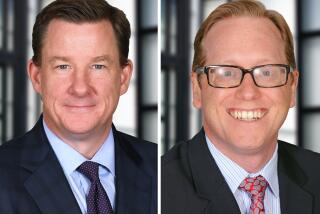Bank Delayed Informing Staff of Subpoena, Lawyer Says
- Share via
NEW YORK — Credit Suisse First Boston didn’t tell staff members they had to save documents about hot stock offerings until more than two weeks after getting a grand jury subpoena for the files, a witness testified Tuesday in the criminal trial of former Silicon Valley financier Frank Quattrone.
David Brodsky, CSFB’s former regional general counsel, said during cross-examination that a memo ordering staff members to save all stock-offering documents was sent by the bank’s legal department on Dec. 7, 2000, more than two weeks after it had received the subpoena.
Brodsky’s testimony came during intense cross-examination by Quattrone’s lawyer, John Keker.
U.S. prosecutors contend Quattrone obstructed justice when he forwarded and approved an e-mail written by a subordinate that told investment bankers in the technology department to “clean up” their files in early December 2000.
Brodsky, the prosecution’s star witness, offered damaging testimony last week when he said he had told Quattrone that federal grand jury subpoenas had been issued two days before Quattrone sent his e-mail.
Keker sought to discredit Brodsky during cross-examination Tuesday, portraying him as the executive who should have told employees not to destroy documents well before Quattrone’s e-mail was ever sent.
Keker tried to find inconsistencies between Brodsky’s comments during the trial and what he had told investigators. He also said Brodsky defied a requirement of the subpoena by not informing the government that documents may have been destroyed.
Brodsky said five of the eight CSFB executives ordered to testify before the grand jury had not been informed of the subpoenas for weeks. The reason, he testified, was that he had hoped to get the subpoenas lifted.
Quattrone will take the stand once the defense presents its case, which could begin as soon as today. Keker is likely to try to prove that his client did not know subpoenas had been issued for documents kept by his investment banking department when he sent his e-mail.
After the jury was dismissed for the day, Judge Richard Owen rejected two defense motions.
One would have prevented Gary Lynch, CSFB’s top lawyer, who is expected to testify today for the prosecution, from telling jurors that Quattrone told him during an internal investigation early this year that he had not been aware of the government investigations when he sent his e-mail.
Evidence has shown that Quattrone had been informed about the probes. But Keker argued that Quattrone spoke with Lynch 2 1/2 years later and shouldn’t be faulted for not remembering the sequence of events.
The judge also refused Keker’s request for permission to tell the trial jury that the grand jury had never brought any charges.
Reuters was used in compiling this report.
More to Read
Inside the business of entertainment
The Wide Shot brings you news, analysis and insights on everything from streaming wars to production — and what it all means for the future.
You may occasionally receive promotional content from the Los Angeles Times.










